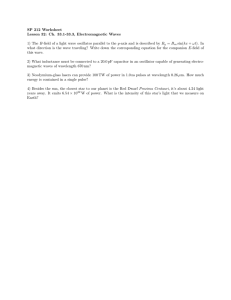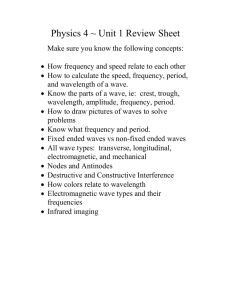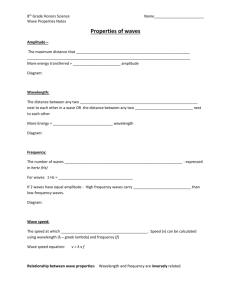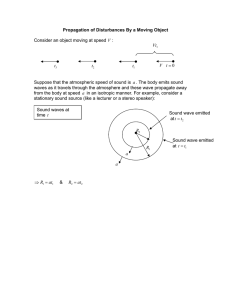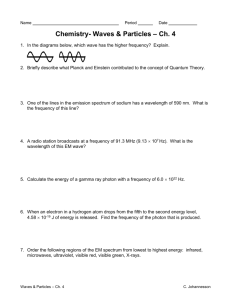A) frequency B) period C) wavelength D) phase 1. A change in the
advertisement
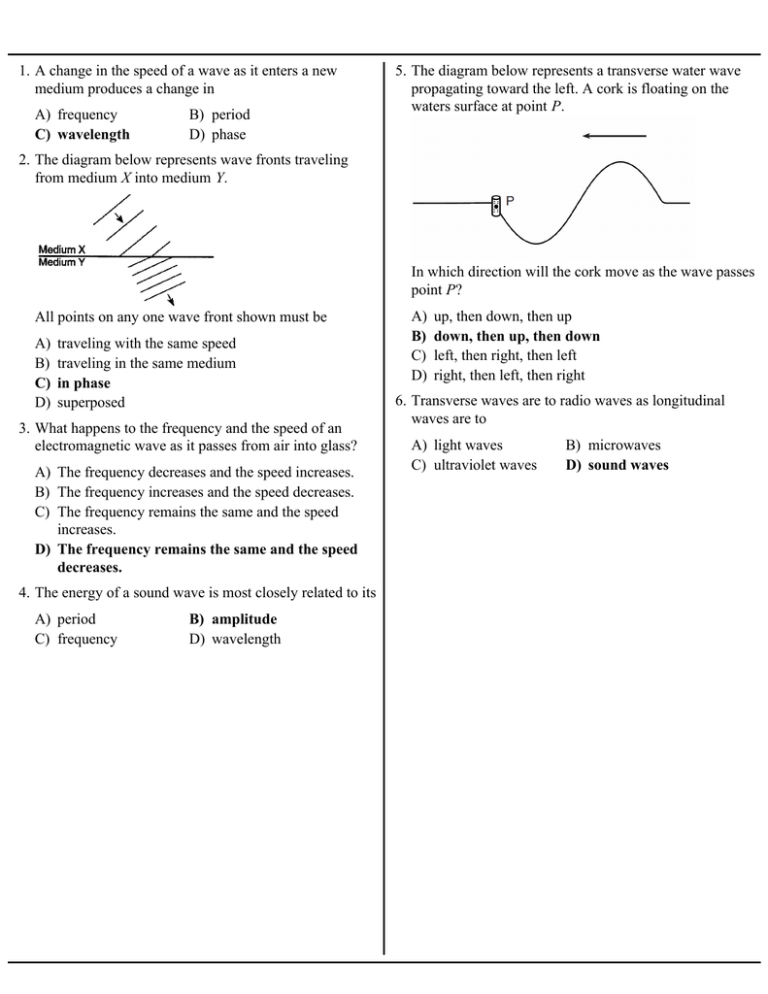
1. A change in the speed of a wave as it enters a new medium produces a change in A) frequency C) wavelength B) period D) phase 5. The diagram below represents a transverse water wave propagating toward the left. A cork is floating on the waters surface at point P. 2. The diagram below represents wave fronts traveling from medium X into medium Y. In which direction will the cork move as the wave passes point P? All points on any one wave front shown must be A) B) C) D) traveling with the same speed traveling in the same medium in phase superposed 3. What happens to the frequency and the speed of an electromagnetic wave as it passes from air into glass? A) The frequency decreases and the speed increases. B) The frequency increases and the speed decreases. C) The frequency remains the same and the speed increases. D) The frequency remains the same and the speed decreases. 4. The energy of a sound wave is most closely related to its A) period C) frequency B) amplitude D) wavelength A) B) C) D) up, then down, then up down, then up, then down left, then right, then left right, then left, then right 6. Transverse waves are to radio waves as longitudinal waves are to A) light waves C) ultraviolet waves B) microwaves D) sound waves Base your answers to questions 7 through 9 on the information and diagram below. A longitudinal wave moves to the right through a uniform medium, as shown below. Point A, B, C, D, and E represent the positions of particles of the medium 7. The energy of this wave is related to its A) amplitude B) period C) speed D) wavelength 8. The wavelength of this wave is equal to the distance between points A) A and B B) A and C C) B and C D) B and E 9. Which diagram best represents the motion of the particle at position C as the wave moves to the right? A) B) C) 10. Base your answer to the following question on the diagram of a Slinky spring shown below. The interval representing one wavelength is A) AB B) AC C) AD D) AE 11. A physics student takes her pulse and determines that her heart beats periodically 60 times in 60 seconds. The period of her heartbeat is A) 1 Hz B) 60 Hz C) 1 s D) 60 s 12. While sitting in a boat, a fisherman observes that two complete waves pass by his position every 4 seconds. What is the period of these waves? A) 0.5 s B) 2 s C) 8 s D) 4 s D) 13. Base your answer to the following question on the diagram below which represents waves generated in a spring. What is the frequency of the waves if it takes 5.0 seconds to generate 10 compressions? A) 0.50 cycles/sec C) 10. cycles/sec B) 2.0 cycles/sec D) 50. cycles/sec 14. The graph below represents the displacement of a point in a medium as a function of time as a wave passes through the medium. What is the frequency of the wave? A) 1/2 Hz C) 1/4 Hz B) 2 Hz D) 4 Hz 15. The periodic wave in the diagram below has a frequency of 40. hertz. 18. Waves are traveling with a speed of three meters per second toward P as shown in the diagram. If three crests pass P in one second, the wavelength is A) 1 m B) 6 m C) 3 m D) 9 m 19. A car’s horn produces a sound wave of constant frequency. As the car speeds up going away from a stationary spectator, the sound wave detected by the spectator A) decreases in amplitude and decreases in frequency B) decreases in amplitude and increases in frequency C) increases in amplitude and decreases in frequency D) increases in amplitude and increases in frequency What is the speed of the wave? A) 13 m/s C) 60. m/s B) 27 m/s D) 120 m/s 16. Which equation correctly relates the speed v, wavelength , and period T of a periodic wave? A) v = T B) v = T C) v = T 2 D) v = T 17. What is the velocity of a wave having a frequency of 25 cycles per second and a wavelength of 10 meters? A) 2.5 m/s C) 35 m/s B) 15 m/s D) 250 m/s 20. A train sounds a whistle of constant frequency as it leaves the train station. Compared to the sound emitted by the whistle, the sound that the passengers standing on the platform hear has a frequency that is A) lower, because the sound-wave fronts reach the platform at a frequency lower than the frequency at which they are produced B) lower, because the sound-wave travels more slowly in the still air above the platform than in the rushing air near the train C) higher, because the sound-wave fronts reach the platform at a frequency higher than the frequency at which they are produced D) higher, because the sound-wave travels faster in the still air above the platform than in the rushing air near the train 21. What is characteristic of both sound waves and electromagnetic waves? A) B) C) D) They require a medium. They transfer energy. They are mechanical waves. They are longitudinal waves. 22. Which statement describes a characteristics common to all electromagnetic waves and mechanical waves? 27. The diagram below shows a standing wave in a string clamped at each end. A) Both types of waves travel at the same speed. B) Both types of waves require a material medium for propagation. C) Both types of waves propagate in a vacuum. D) Both types of waves transfer energy. 23. If the frequency of a sound wave in air at STP remains constant, its energy can be varied by changing its A) amplitude C) wavelength B) speed D) period 24. Waves transfer energy between two points with no transfer of A) work C) mass B) momentum D) force 25. The diagram below represents two pulses approaching each other from opposite directions in the same medium. What is the total number of nodes and antinodes in the standing wave? A) B) C) D) 3 nodes and 2 antinodes 2 nodes and 3 antinodes 5 nodes and 4 antinodes 4 nodes and 5 antinodes 28. While playing, two children create a standing wave in a rope, as shown in the diagram below. A third child participates by jumping the rope. Which diagram best represents the medium after the pulses have passed through each other? A) What is the wavelength of this standing wave? A) 2.15 m C) 6.45 m B) 29. The superposition of two waves traveling in the same medium produces a standing wave pattern if the two waves have C) D) 26. Which phrase best describes a periodic wave? A) B) C) D) B) 4.30 m D) 8.60 m a single pulse traveling at constant speed a series of pulses at irregular intervals a series of pulses at regular intervals a single pulse traveling at different speeds in the same medium A) the same frequency, the same amplitude, and travel in the same direction B) the same frequency, the same amplitude, and travel in opposite directions C) the same frequency, different amplitudes, and travel in the same direction D) the same frequency, different amplitudes, and travel in opposite directions 30. The diagram below represents a light ray reflecting from a plane mirror. The angle of reflection for the light ray is A) 25° B) 35° C) 50.° D) 65° Answer Key waves review 15 1. C 2. C 3. D 4. B 5. B 6. D 7. A 8. B 9. D 10. B 11. C 12. B 13. B 14. B 15. C 16. C 17. D 18. A 19. A 20. A 21. B 22. D 23. A 24. C 25. B 26. C 27. C 28. D 29. B 30. A
